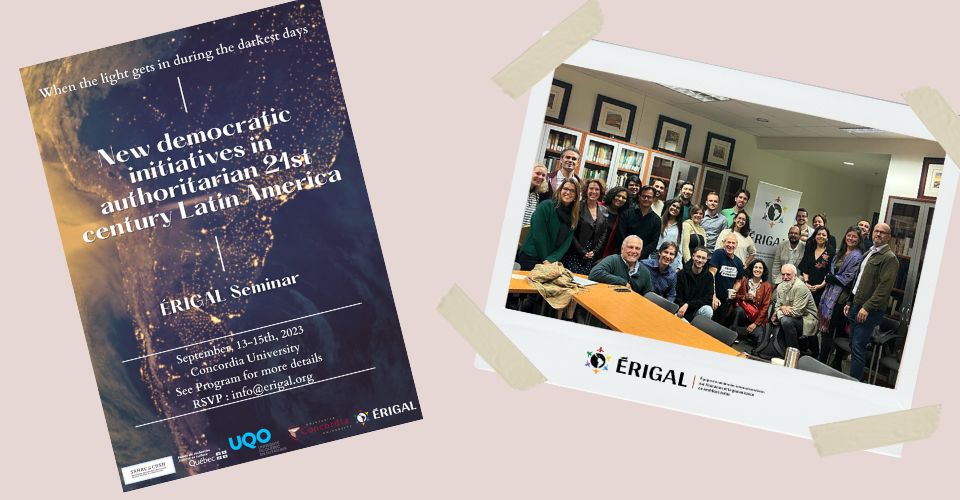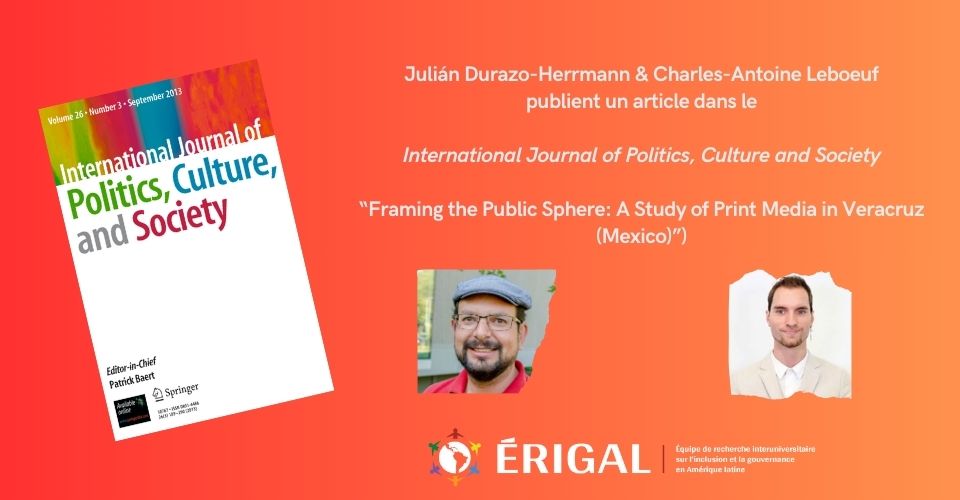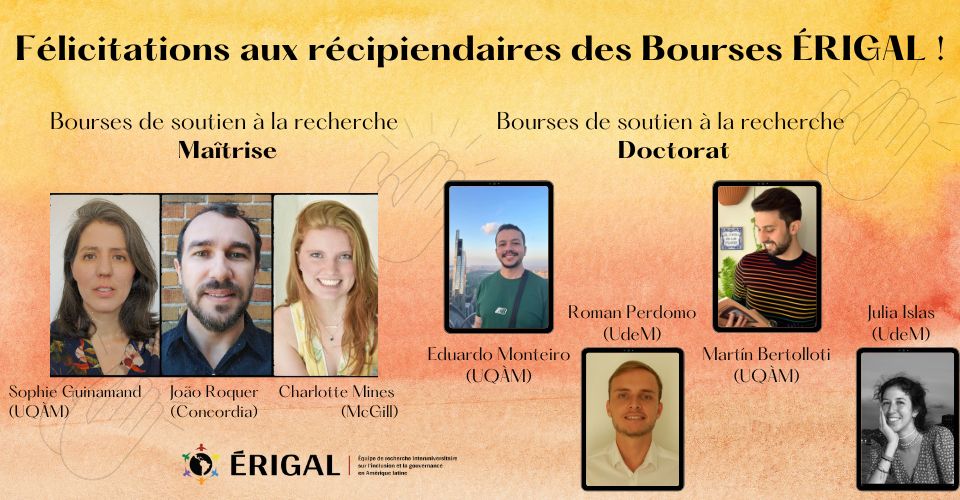Success of our seminar New Democratic Initiatives in Authoritarian 21st Century Latin America, at Concordia, from September 13th to 15th, 2023!

Our back-to-school event, an ERIGAL seminar organized by Charmain Levy (a professor at UQO and a member of ERIGAL) and Manuel Larrabure (a post-doctoral researcher at Bucknell University), brought together over twenty specialists from the region. Hailing from various social science disciplines (anthropology, sociology, political science, geography, and history), they delved into the question of democratic initiatives amidst the crisis of democracy in Latin America in the 21st century. The seminar welcomed over 60 attendees in total and concluded on Friday, September 15, after three days of conferences, panels, exchanges, and enriching, stimulating discussions.
On the first day, Rosana Pinheiro-Machado (a researcher at University College Dublin) presented a conference on the interplay of phenomena of hatred, as well as the hopes that could be nurtured in Latin America regarding democratic vitality and rights from a Global South perspective.
The second day provided an opportunity to delve deeper into various cases of intersectional struggles and innovations. This included examining the anti-ableist feminist struggles in La Paz, Bolivia (featuring Edelweiss Murillo Lafuente, a doctoral researcher at the University of Florida); the LGBTQI+ activist networks in Argentina (led by Juan Grandinetti, a post-doctoral researcher at the National General University of Sarmiento); challenges to indigenous autonomy, particularly in the Mexican context (with insights from Richard Stahler-Sholk, a distinguished researcher at the University of Michigan); and finally, the phenomenon of the consolidation of feminist movements and the right's reaction in Argentina, presented by Veronica Norando (a researcher at Carleton University).
In the afternoon, Thomas Chiasson-Lebel (a researcher at the University of French Ontario) explored the concept of counter-hegemony, aiming to grasp the paradox of the 2019 uprisings in Chile and Ecuador. Ricardo Alves-Cavalheiro (a researcher at the State University of Santa Catarina) presented research that compares five cases of collective mandates – democratic initiatives that develop within the legislative branch in Brazil. Finally, Daniel Schugurensky (a researcher at Arizona State University) conducted a comparative study between different participatory initiatives of the second Latin American pink wave, questioning the tension between authoritarian dimensions and, on the contrary, the aspects of these initiatives that deepen democracy.
In the evening, Fernando Leiva (a researcher at the University of California, Santa Cruz) delivered a conference on the relevance of the concept of "Neo-Ordoliberalism" to characterize and analyze the discourses and policies implemented by the center-left and the current Chilean left since the return to democracy.
The third and final day commenced with a conference by Françoise Montambeault, a researcher at the University of Montreal and director of ERIGAL, addressing new citizen and participatory practices in Latin America and their subsequent impact on the evolution of democracy throughout the subcontinent.
The subsequent panel focused on the persistence, resurgences, and shifts in authoritarian practices and contexts in Latin America. Tamara Ortega-Uribe, a doctoral researcher at the University of California, Santa Cruz, presented on the construction of a prefigurative "demos" within postliberal democracies, within the right-wing neopopulist political imaginaries in Chile. Leandro Vergara-Camus, a researcher at the University of French Ontario, also explored the agribusiness policies of the Brazilian right from 2006 until 2022, illustrating the oscillation of these groups between pragmatism and extremist radicalization.
In the afternoon, the final panel centered on the struggles of civil society. João Roque da Silva Jr., a master's researcher at Concordia University, analyzed the resistance from workers in the cultural sector in Brazil. Then, Ana Laura Rodríguez, a researcher at Universidad Nacional de San Martín, compared four urban feminism initiatives in Latin America, spanning the continent, through the lens of the question of the commons. Jonas Lefebvre, a doctoral researcher at the University of Montreal, examined the example of the Lomba da Pinheiro district in Porto Alegre to address the question of collective action in the context of democratic erosion. Finally, Roman Perdomo, a doctoral researcher at the University of Montreal, explored the changes in civil society in Peru in response to Covid and authoritarian threats between 2016 and 2022.
All panel presentations were followed by comments from the panel discussants.
To conclude, the co-organizers, Manuel Larrabure and Charmain Levy, along with Nora Nagels (a researcher at the University of Quebec in Montreal and a member of ERIGAL), offered their final remarks during a closing round table, moderated by Jean François Mayer (a researcher at Concordia University and also a member of ERIGAL)!
We extend our gratitude to the organizers, all the participants, as well as the public, students, and researchers who attended in large numbers for their presence and their enthusiasm!
Lastly, these contributions will be compiled into a joint publication slated for release in 2024, so stay tuned!


